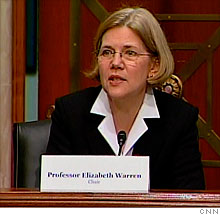Watchdog wants stress test do-over
Congressional Oversight Panel cites rising unemployment as a reason why big banks need another stress test; also calls for more details about tests.
 |
| Elizabeth Warren, chairwoman of the Congressional Oversight Panel, one of the three organizations overseeing TARP, is calling for regulators to release more details about the stress tests. |
NEW YORK (CNNMoney.com) -- Banks that were stress tested by the government earlier this year should undergo another round of examinations, a government watchdog group said Tuesday, amid signs that the U.S. economy may be deteriorating faster than first expected.
In its latest report to lawmakers, the Congressional Oversight Panel pointed to the unemployment report for the month of May as a sign that the stress tests were not stressful enough.
Even as the pace of job losses slowed during the month, the unemployment rate surged to a 26-year high of 9.4%. Banking regulators that devised the stress tests had said in their most "adverse" case scenario that the jobless rate would hit 8.9% in 2009.
"The employment numbers for 2009 have already exceeded the harshest scenario considered so far, suggesting that the stress tests should be repeated," the report said.
Banks' loan losses tend to track the rate of unemployment, as out-of-work consumers typically find themselves unable to stay current on their monthly payments including car loans, mortgages and credit cards.
Hoping to determine the scope of some of those losses, as well as identify which institutions might need additional support, government regulators launched a stress test program for the nation's 19 largest banks in February.
All of the lenders that participated were deemed solvent when the results from the tests were announced last month. Ten of those 19, however, were said to face a nearly $75 billion capital shortfall and ordered to raise funds as a result.
Leading the group was Bank of America (BAC, Fortune 500), which faced a $33.9 billion shortfall. Wells Fargo (WFC, Fortune 500) and Citigroup (C, Fortune 500) were deemed to need $13.7 billion and $5.5 billion respectively.
As part of the program, regulators considered how banks' loan portfolios would perform under two different economic scenarios, including an "adverse" situation, through 2010.
Some critics have expressed concerns that the economic estimates used by regulators, including those for unemployment, were not stringent enough.
Regulators, however, have defended their projections. By being overly severe, officials feared that banks would not only balk at the results, but that many lenders would find themselves with an excessive amount of capital.
In Tuesday's report, however, the Congressional Oversight Panel questioned whether those projections looked far enough ahead in the future. There is speculation, for example, that defaults on commercial real estate loans could escalate after 2010.
The panel, which reports monthly on the Treasury Department's Troubled Asset Relief Program, or TARP, also called for even more transparency regarding the stress tests.
Specifically, the panel suggested that regulators release more details about the methodology behind the tests so analysts could replicate the results and also use them to look at the health of other banks.
That will be key as several banks are soon expected to get approval from regulators to redeem preferred shares they received from the government as part of TARP.
"Transparency will also be critical as financial institutions seek to repay their TARP loans, both to assess the strength of these institutions and to assure that the process by which these loans are repaid is fair," the report said.
In light of its findings, the five-member panel, led by chairwoman Elizabeth Warren, recommended that banks remain subject to government stress tests as long as they carry toxic assets on their books.
Warren will appear at a hearing in front of Congress' Joint Economic Committee Tuesday morning to discuss the report.
The panel also cautioned that banks should not be forced to participate in "fire sales" of assets, which could potentially require the investment of even more taxpayer money. Instead, banks should have some flexibility to realize the "full value of for their assets," the panel said in the report.
It was not clear whether those comments were targeted at the government's Public-Private Investment Program (PPIP), which aimed to flush out some of the toxic assets from banks' balance sheets.
Part of that program, which dealt with so-called "legacy loans", was shelved last week by the Federal Deposit Insurance Corp. after banks raised an impressive amount of capital in recent weeks. ![]()


